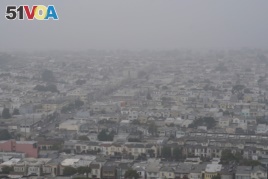15 September 2020
Wildfires burning across the western United States will continue releasing smelly, harmful air until later in the week or after that, scientists say. They add that the smoky, cloud-covered skies might last even longer.
People in Oregon, Washington and parts of California were struggling with yellowish-green smog caused by the fires. The air is the worst, most unhealthy air on the planet, by some measurements.
The bad air is everywhere. It has entered homes and businesses. It caused the Oregon Zoo in Portland to close. No one can escape it.
"I don't think that we should be outside, but at the same time, we've been cooped up in the house already for months," said Issa Ubidia-Luckett of Portland. "I mean, we shouldn't be outside period."
Oregon's Department of Environmental Quality extended its air quality warning until Thursday. It was supposed to end on Monday.
On Monday, Alaska Airlines announced it was suspending flights to Portland and Spokane, Washington, until late Tuesday. The company said the air was too thick.
Zoe Flanagan has lived in Portland for 12 years. She rarely leaves her house. She went out into the smog to walk her two dogs Monday.
"I can feel it in my chest and.... I just couldn't get enough water, I had a headache," she said.
Dylan Darling is a spokesman for Oregon's Department of Environmental Quality.
"I grew up in Oregon and lived here a long time, and to see this much smoke for this long and wide spreading, really stands out in the state's history," he said.

Smoke from wildfires and fog obscure the view of the ocean from Grand View Park in San Francisco, Monday, Sept. 14, 2020. (AP Photo/Jeff Chiu)
Some areas of central California covered with smoke are not likely to see conditions improve until October, said meteorologist Dan Borsum. He is studying weather conditions and sharing his information with firefighters in Northern California.
"It's going to take a...strong weather pattern to move all the smoke," he told reporters Sunday night.
Borsum added that smoke from over 20 wildfires in the West and throughout California is gathering in the Central Valley. The area already has some of California's worst air quality, even before the wildfires.
Darling said that during earlier wildfires in Oregon, such as the fires of 2017, people could travel to other parts of the state for fresh air. Not this time.
"There just isn't a place in Oregon right now to find fresh air," Darling said.
Tyler Kranz is a meteorologist at the U.S. National Weather Service office in Portland. He said Oregon will need strong winds blowing from the ocean towards land to clear the air. But he said there needs to be a "perfect balance" of wind so that it blows away the smoke but does not start more fires.
"We need the winds to get the smoke out of here," Kranz said. "We just don't want them to be too strong, because then they could fan those flames and all of a sudden those fires are spreading again."
I'm Susan Shand.
The Associated Press reported this story. Susan Shand adapted it for Learning English. George Grow was the editor.
________________________________________________________________
Words in This Story
smog – n. thick, dirty air and fog
meteorologist – n. a weather expert
cooped up – v. trapped inside with no relief
pattern – n. a repetitive system
fan – v. to increase air flow